Almost There: James Dean in "Rebel Without a Cause"
 Wednesday, August 17, 2022 at 11:59AM
Wednesday, August 17, 2022 at 11:59AM 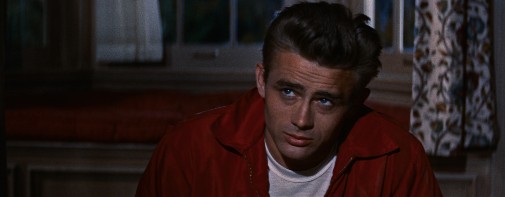
Today, it's time for another name from your list of requests – James Dean. The doomed star was nominated posthumously for Best Actor in 1955 and 1956 for his work on East of Eden and Giant. In that first year, however, he was also in Nicholas Ray's Rebel Without a Cause, delivering a performance that's arguably more iconic than the one that got him Academy recognition. Playing a troubled teen, Dean embodied a new archetype and carved a place for himself in the annals of Hollywood history.
Considering the actor's meteoric rise and both films' popularity, it's fair to say that Dean got some votes for the Ray-helmed adolescent drama. Indeed, if not for the other flick, he probably would have scored a nom for Rebel Without a Cause…
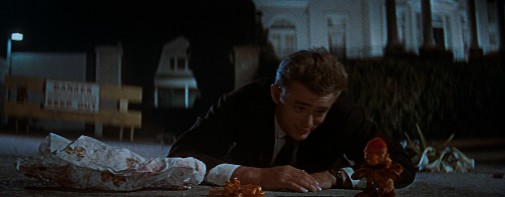
With a title taken from Robert M. Lindner's hypnoanalysis of a criminal psychopath, Rebel Without a Cause is the story of three teenagers in mid-1950s Los Angeles. First, Jim Stark deals with his anguish by getting shitfaced. Second, Judy is a rebellious young woman whose rebellion stems from her father's lack of acknowledgment. Indeed, she feels he resents her because she's no longer a little girl and acts up by behaving like what the patriarch calls a "dirty tramp." Finally, John 'Plato' Crawford suffers from abandonment issues. His father left when he was just a toddler, and his mother pays him no mind. He's also gay, though the text never spells it out.
We meet them on a night when all three are taken into police custody. But of course, we first glimpse James Dean's Jim before the action moves to the station. In a memorable opening, the actor drunkenly drops into the frame, playing with childish toys through a haze of intoxicated glee. It's a sight that verges on comedy if not for the man's projected innocence, a simple carelessness that contrasts violently with Jim's antics once with the cops. Talking to officer Ray, the teen gives himself to vociferous fury, verbalizing all his storming feelings with abandon. One can sense Dean's strain, the actorly exercise of going to the limit and beyond.
![]()
"You're tearing me apart! You say one thing, he says another, and everybody changes back again." – Jim screams in what must be the most famous scene Dean ever played in his short life. The line delivery is overwrought to the point of parody, and yet, Dean makes the distress palpable, tangible, as undeniable as any universal certainty. He plays it with his whole body, a frenetic prelude to a performance that, when not exploding, can be surprisingly quiet. He's more passive than one might suppose, observant and reactive, his physicality sleepy and underplayed. In such passages, like the planetarium show, what shines brightest is the character's hushed interiority.
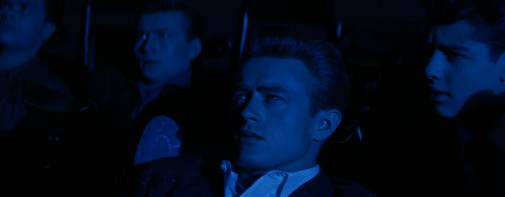
But what's the reason for his great discontent? Jim doesn't have one beyond the erstwhile pop psychology reasoning that links a rise in delinquency with the ascendance of female independence. Like some twisted terror modeled by midcentury conservatism, Jim hates his father for how much he lets himself be subservient to the boy's mother, all articulated in a disgusted tirade the boy vomits. And yet, to exclusively associate the boy's unhappiness with misogynistic discomfort feels wrong. It further feels like missing the point altogether.
His despair is deeper and more abstract than a simple roar of toxic masculinity, 50s-style. There's an existentialist verve to his misery, dismal darkness that regards life and sees no reason to keep living. To read the film as sociology is a disservice, even though there's much to be said about the pressure cooker effects of conformity on the youth. It's also a disservice to Dean's performance, always better when approached on its terms rather than through a search for a higher purpose. More than a treatise on all that is wrong with the younger generation, Jim Stark's story is a visceral cry untethered from reason.
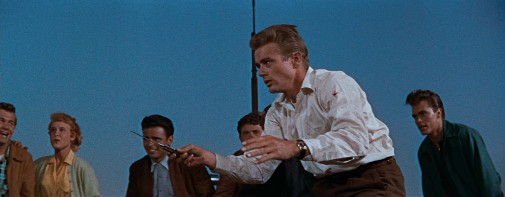
It's a primordial myth in lurid WarnerColor that feasts on the inchoate emotionality of teenagers and regurgitates a concentration of all that is ineffable about those strange young things. To take it at face value is a failure of imagination and a detriment to the viewing experience. Better to accept you're watching a poem full of fatalistic portent in Byronic styles and Shakespearean aspirations. Is it a bit precocious and hysterical, a tad pretentious? Of course, but so are teenagers. Moreover, as presented and performed, this narrative feels like the doomed fantasy teens would tell about themselves—the excess tastes of authenticity.
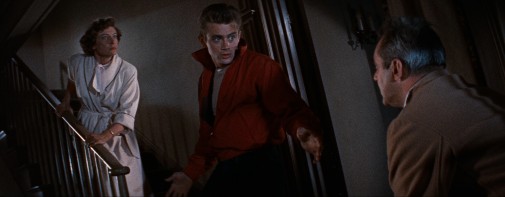
Notably, one must have in mind that what Dean is doing here is not realism, not really. Instead, it's Baroque extravagance scorching the suburban setting with paroxysms of raw emotion expressed through florid melodrama. At the same time, there's a strange quality to Dean as a cultural phenomenon and cinematic property that this performance epitomizes. Despite all the messy acting exercise excess of Jim Stark, he's also blank enough for the audience to project whatever they want unto him – specifically, the causeless rebellion that reverberates in the title. You can see so many aims in Dean's desperate characterization, an assortment of possibilities that has allowed him to live on as a legend whose legacy goes beyond a tragic end.
In many ways, he is the eternal cinematic youngster, ready to typify whatever new generation wants to see in him, a mirror that reflects audiences for all eternity. It's an ambiguity contradictorily born from just how specific Dean feels as a performer, a nebulous question whose answer is provided by each spectator. In other words, Jim Stark works because he is an enigma, and that's what Dean, as a movie star, brought to every role whether he or his directors knew it or not. Rebel Without a Cause works because there's no reason for its tragedy. It's unsettlingly meaningless. Gaze into Jim Stark's beautiful visage, and you'll get no generational diagnostic. You'll just get pain.
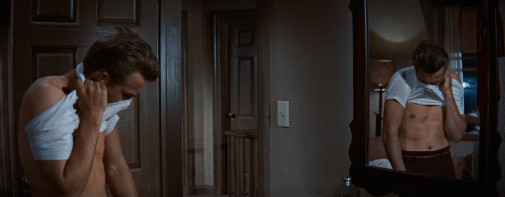
That and the pull of desire, of course. Another vital component of Dean's Jim is his sexual allure, the queerness of his presence, and how it destabilizes those around him. It's no news that James Dean was hot, but there's more to it when he's seen through the camera. He's threateningly sensual, infuriating the school hellion with his mere existence, a mix of horniness and provocation sparking whenever the two meet. But it's not just Buzz the bully. Everyone seems somewhat drawn to Jim, a difficult thing to sustain for any actor. Dean, though, manages to do it just fine in what may be the only effortless element of his performance.
Though he came to signify the arrival of a new school of acting that ran against the precepts of Old Hollywood make-belief, Dean was a star in the old-fashioned sense. Project him big on the screen, and the man electrifies it. Furthermore, while the loud postulations of aggressive masculinity are the best remembered moments of Dean's performance, his softer side is as revelatory, if not more. I love his laugh when the cops frisk him, a boyish gesture that drips with a strange sexual suggestion. His gait transpires confidence even as Jim curls into himself, cocksure bravado mixed with sensitivity for a potent cocktail. Even the improvised bit when Jim cools his face with a milk bottle feels impregnated with erogenous potential.
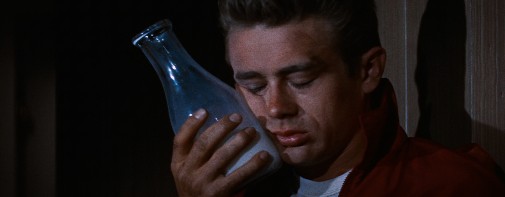
Finally, one must consider the connection between Dean and his two costars – Sal Mineo as Plato and Natalie Wood as Judy. There's gentility in how Jim handles Plato, showing that he understands the other boy's attraction and, though he doesn't reciprocate it, still responds with kindness. A similar thing happens with Judy. A spark of recognition melts into affection as if he understands her confusion better than anyone else, even Judy herself. The three play off each other beautifully, creating a tender center for the movie's sad tale. During a brief nocturnal respite, they form a utopian family, and, for a short, shining moment, heaven exists on film.
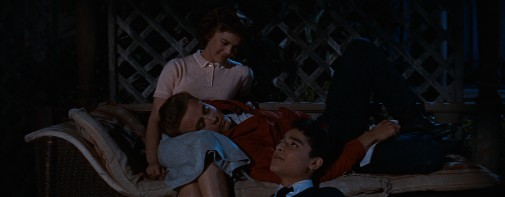
Wouldn't it have been apt to recognize these three complementary performances in one go? Sadly, things didn't pan out that way. According to Academy rules, actors can't be nominated twice in the same category in the same year. All things considered, that's probably the only reason why James Dean didn't score a double nod in 1955. Though East of Eden was embraced by AMPAS, with four nominations and a win, Rebel Without a Cause wasn't far behind. Ray's seminal flick was in contention for two acting prizes and a writing honor, too.
For all these reasons, it's not hard to imagine a world where Dean gets nominated for Rebel instead of Eden – the vote must have been close. In the end, however, the actual nominees were Ernest Borgnine in Marty, James Cagney in Love Me or Leave Me, Dean in East of Eden, Frank Sinatra in The Man with the Golden Arm, and Spencer Tracy in Bad Day at Black Rock. Borgnine won, adding another victory to the bounty of that year's Best Picture champion.

Rebel Without a Cause is streaming on HBO Max. You can also find the movie on most services, available to rent or purchase.



Reader Comments (6)
The published rules for the 1955 Academy Awards reads in part, “In the event that two achievements by an actor or actress shall receive sufficient votes to be nominated in the same category, only the one which, in the preferential tabulation process, first receives the quota (number of votes required to be nominated) shall be nominated. The votes for the second achievement shall thereupon be redistributed.”
James Dean is the reason this rule should not exist. He richly deserved two Best Actor nominations in 1955.
At the first 11 Oscar ceremonies, directors could receive two nominations for separate films. The Board of Governors then imposed a limitation of only one nomination per director per year. That restriction was rescinded in 1975. While AMPAS never released a statement justifying the change, industry talk indicated that the inability to recognize director Francis Ford Coppola for both Best Picture winner The Godfather Part II and Best Picture nominee and Palme d’Or winner The Conversation in 1974 prompted the rule change.
Nothing has changed for acting even though most other Oscar categories allow dual nominations for two separate projects. Despite James Dean’s brilliance in two films in the same year, AMPAS still restricts actors to a sole nomination.
What is your opinion about Alyshia Ochse acting in the movie bad sister? Don't you think that it is the best performance of their career?
What is your opinion about Alyshia Ochse acting in the movie bad sister? Don't you think that it is the best performance of their career?
This movie is one of my favorites, and I’m kind of surprised by how seldom I see it on other people’s lists of favorite or “best” films these days. Has it gone out of fashion? There was a time when this was the movie Nicholas Ray was most known for, and maybe it still is in some respects, but it certainly doesn’t seem to be his most acclaimed anymore as Johnny Guitar, In a Lonely Place, and Bigger Than Life (all also great films, the latter being my personal favorite) seem to have eclipsed it. Maybe it’s time to reevaluate Nicholas Ray in general as a director who made at least four masterpieces and deserves to be placed right up there with the best.
Also, I agree with Finbar that the Academy’s rule about actors not being able to be double nominated in the same category is stupid considering double nominees are allowed in literally every other category. And yeah, James Dean in ‘55 is probably THE example of when a double nomination in the same category should have happened.
Finbar - in theory, I hear you and I agree. But in practice I'm glad they have this rule. I think it would make their voting even lazier if they could select favourites twice in a category.
Edwin -- i also think this is weirdly underdiscussed today. It's such a great movie. And worth remembering for far more than James Dean's brilliant performance.
This is an incredible performance. On its own merits, Dean is just doing so much here, and he does a fine job of creating a person and giving a star performance. On the other hand, it's such a seismic performance for the depiction of teens in film. It's truly a break with what came before in that regard, especially given the sort of "young people" performances that the academy previously nominated/rewarded.
I think this is a great review, and the utopian family moment is one of the most memorable for me. I think Dean handles that tricky materiel well. I also think Ray just makes good use of Dean's queerness.
I have to imagine that Sinatra was pretty happy that Dean couldn't be nominated twice. I'm happy he got a nom this year regardless. East of Eden is a more academy friendly movie, and performance, and I the got higher profile nominations. It makes sense he was honored there.
In terms of its legacy, I do feel like it has waned over the years. It felt like in the 90s and 2000s it was more well known. Not sure why, but I love it. I also suspect that among anyone that's a cinephile or interested in the history of film, this one looms large, not only because of Dean and its queerness, but because of Ray and his connections to the New Wave.